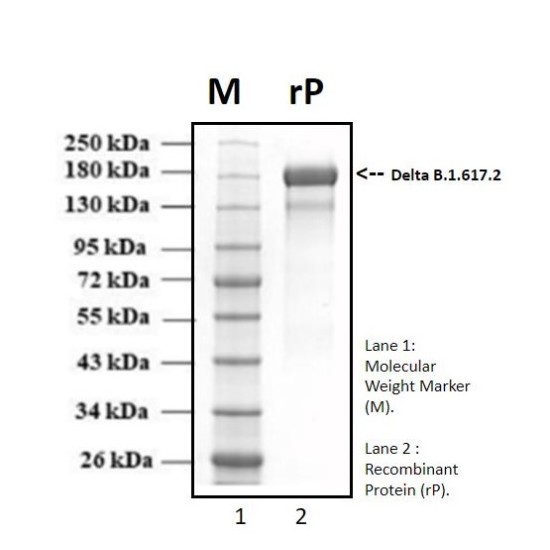
The first reports of atypical pneumonia in China were announced at the very end of 2019, in the city of Wuhan, Hubei province. Its cause was identified in January 2020 as a novel β-CoV (1), named SARS-CoV-2, which started spreading very quickly causing a global pandemic COVID-19. Spike protein attaches the virion to the cell membrane by interacting with host receptor, initiating the infection. Binding to human ACE2 receptor and internalization of the virus into the endosomes of the host cell induces conformational changes in the Spike glycoprotein (2, 3). The protein forms a trimer in vivo mediating receptor binding and membrane fusion (4). It has been demonstrated by Florian Krammer’s group that certain mutations and the inclusion of trimerization motif can stabilize recombinant Spike protein (5, 6). The original Wuhan strain of the virus has become quickly replaced by its more transmissible variant, mainly determined by a single amino acid point mutation D614G (7). A novel SARS-CoV-2 variant, B.1.617, known as Indian variant, originated in India and quickly became dominant (8,9).
Product is shipped either on dry or wet ice or frozen gel packs. Upon receipt, store at -20°C to -70°C
| Antibodies | |
| Amino Acids | 16-1211 |
| Application Note | For research purposes only. Not for use in humans. |
| Endotoxins | Less than 0.1 ng/µg (1 IEU/µg), as measured by LAL method. |
| Formulations | PBS 20% Glycerol |
| Grade & Purity | >90% as estimated by SDS-PAGE stained with Instant Blue Stain (Abcam). |
| Molecular Weight | 137 kDa |
| Protein ID | P0DTC |
| Sequence | VNLRTRTQLPPAYTNSFTRGVYYPDKVFRSSVLHSTQDLFLPFFSNVTWFHAIHVSGTNGTKRFDNPVLPFNDGVYFASTEKSNIIRGWIFGT TLDSKTQSLLIVNNATNVVIKVCEFQFCNDPFLDVYYHKNNKSWMESGVYSSANNCTFEYVSQPFLMDLEGKQGNFKNLREFVFKNIDGYFKI YSKHTPINLVRDLPQGFSALEPLVDLPIGINITRFQTLLALHRSYLTPGDSSSGWTAGAAAYYVGYLQPRTFLLKYNENGTITDAVDCALDPL SETKCTLKSFTVEKGIYQTSNFRVQPTESIVRFPNITNLCPFGEVFNATRFASVYAWNRKRISNCVADYSVLYNSASFSTFKCYGVSPTKLND LCFTNVYADSFVIRGDEVRQIAPGQTGKIADYNYKLPDDFTGCVIAWNSNNLDSKVGGNYNYRYRLFRKSNLKPFERDISTEIYQAGSKPCNG VEGFNCYFPLQSYGFQPTNGVGYQPYRVVVLSFELLHAPATVCGPKKSTNLVKNKCVNFNFNGLTGTGVLTESNKKFLPFQQFGRDIADTTDA VRDPQTLEILDITPCSFGGVSVITPGTNTSNQVAVLYQGVNCTEVPVAIHADQLTPTWRVYSTGSNVFQTRAGCLIGAEHVNNSYECDIPIGA GICASYQTQTNSRRGAGSVASQSIIAYTMSLGAENSVAYSNNSIAIPTNFTISVTTEILPVSMTKTSVDCTMYICGDSTECSNLLLQYGSFCT QLNRALTGIAVEQDKNTQEVFAQVKQIYKTPPIKDFGGFNFSQILPDPSKPSKRSPIEDLLFNKVTLADAGFIKQYGDCLGDIAARDLICAQK FNGLTVLPPLLTDEMIAQYTSALLAGTITSGWTFGAGPALQIPFPMQMAYRFNGIGVTQNVLYENQKLIANQFNSAIGKIQDSLSSTPSALGK LQNVVNQNAQALNTLVKQLSSNFGAISSVLNDILSRLDPPEAEVQIDRLITGRLQSLQTYVTQQLIRAAEIRASANLAATKMSECVLGQSKRV DFCGKGYHLMSFPQSAPHGVVFLHVTYVPAQEKNFTTAPAICHDGKAHFPREGVFVSNGTHWFVTQRNFYEPQIITTDNTFVSGNCDVVIGIV NNTVYDPLQPELDSFKEELDKYFKNHTSPDVDLGDISGINASVVNIQKEIDRLNEVAKNLNESLIDLQELGKYEQYIKGSGSGYIPEAPRDGQ AYVRKDGEWVLLSTFLGSGHHHHHHHH |
| Source | HEK293 |
| Species | Severe Acute Respiratory Syndrome Coronavirus 2 |
| Stability | At least 12 months at -20°C to -70°C and at least 1 month at 2°C to 8°C. |
| Storage | The protein should be stored at -20°C to -70°C preferably in small aliquots to avoid repeated freeze-thaw cycles. |
- Stock: In Stock
- Model: DP017
